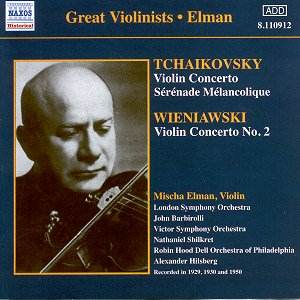The extraordinary thing about Elman is that he seems
to have emerged fully formed as a violinist. It’s difficult now to appreciate
quite how revolutionary his playing must have sounded when, at the age
of 12 and trained by Alexander Fidelman, he auditioned for Fidelman’s
own teacher, Leopold Auer. The great pedagogue had never heard anything
like it, as he freely admitted, and Elman remains one of those rare
cases of the development of an independent tonal aesthetic in isolation
of other influences – he had never heard either Ysaye or Kreisler. His
period of ascendancy was real but brief – chronology has tended to telescope
his primacy in the concert halls of Europe and America – but it was
an unarguable one, lasting from his debut in Berlin in 1904 until the
arrival of Heifetz in 1917.
Elman’s 1929 recording of the Tchaikovsky Concerto
wasn’t in fact the first – Huberman had beaten him to it and another
Auer pupil Eddie Brown had beaten both of them, though his 1924 recording
wasn’t issued at the time and has only ever emerged on a very rare LP.
Throughout Elman’s performance we can hear the battery of devices open
to a player of his standing – succulent portamenti, a ravishing tone,
lava-like in its molten flow, which no-one, not even Toscha Seidel,
could ever match. It remains one of the most remarkable sounds in recorded
music. We can also hear the unhurried tempi, the unobtrusive excellence
of Barbirolli’s conducting, and a performance of persuasive cohesion
strictly on its own terms. As he grew older his playing slowed inordinately,
as much a question of accommodating a failing left hand as of structural
choice, though he was, by nature, generally a master of sedate tempos.
His unusual posture must have complicated the matter – he was a small,
bull-necked and stocky man with short arms and thick fingers (one of
the many reasons advanced over the years for the existence of that molten
vibrato ascribed it to the depth of his finger tip pads). Those who
have seen the Vitaphone short of 1926 contained in The Art of Violin
will have seen how he played at a definite angle, with the scroll of
the fiddle pointing downwards, the better, one supposes, to allow Elman’s
left hand to overcome stretching problems.
Ageing and a slowly diminishing technique had begun
to take their toll by the time he came to record the Wieniawski, the
other major work on this excellently transferred disc. There’s now less
of the fervid intensity in his tone but still much of the old Elman’s
tonal lustre remains. In comparison with the pin point Heifetz recording
or with the almost contemporaneous 1953 Stern one can quite see how
old-fashioned Elman must have seemed. By the side of Stern’s coruscatingly
involving playing – surely one of his greatest performances on disc
– Elman’s fires burn less dazzlingly and generate less obvious heat.
Nevertheless it’s always timely to salute Elman – the BBC has preserved
at least two recitals, from 1961, and failings acknowledged, his was
still an immense talent; let’s hope they will make an appearance in
their series. Meanwhile if you’ve never heard Elman’s 1929 Tchaikovsky
you really should. Here it is, cheap, well presented and transferred
and a fitting living testimony to a remarkable violinist.
Jonathan Woolf
Elman’s succulent portamenti, ravishing tone, lava-like in its molten
flow, which no-one could ever match. One of the most remarkable sounds
in recorded music. … see Full Review


